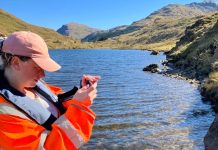The Apollo Protocol will support cross-sector digital twins that will enable each sector to be more sustainable, innovative and cost-effective. Henry Fenby-Taylor of the IET’s Built Environment Panel takes a look
A new white paper that represents a collaboration between the built environment, manufacturing and technology sectors is soon to be released.
This paper, the Apollo Protocol, represents the giant leap toward connected digital twins by creating the conditions for an interconnected ecosystem of digital twins by unifying sectoral approaches.
This effort represents the combined efforts of the Institution of Engineering & Technology (IET), the Advanced Manufacturing Research Centre (AMRC), the Centre for Digital Built Britain (CDBB), TechUK and the Alan Turing Institute.
As well as cross-pollinating expertise, which drives benefits for each sector, there are cross-sector challenges and opportunities, such as sustainability and circularity, that when addressed together form more than the sum of their parts.
The Apollo Protocol is a natural evolution of the National Digital Twin programme
The true performance of manufactured products can’t be established without understanding the context of their use and in the built environment it is not possible to get an accurate enough picture of the performance of assets without understanding performance at the component level. The Apollo Protocol is a natural evolution of the National Digital Twin programme. We have the rules of the game; now we must start creating the connections.
Digital twins make decision-making better by making relevant on-time data available. However, until now digital twins have been developed within existing sectoral silos to different standards and processes.
For example, manufacturing developed a digital twin framework in ISO 23247, which has set the bar for improving productivity, while the built environment has laid the foundations for the definition of digital twins with the Flex 260 standard.
For manufacturing, opportunities still exist beyond the factory gate and the use of manufactured products in the built environment. Within the built environment, digital twins add resilience to infrastructure through performance management of their assets.
The Gemini Principles have set the ethical foundations for the development of connected digital twins within the built environment, now the Apollo Protocol should incorporate the manufacturing and built environment sectors underpinned by the technology sector.
The white paper proposes the creation of the Apollo Forum championed by leaders across manufacturing, the built environment and the technology sectors. Its mission is to create and define the Apollo Protocol to bridge sectors, untangling and aligning cultural, process and technological factors.
The forum will explore four initial key themes:
Aligning the value chain
To identify a single value chain for data and information management and push this new paradigm through to policymakers responsible for procurement.
Circular supply chains
To pursue circularity through the alignment of trade standards and processes; to realise the benefit of different material consumptions through new business models.
Performance optimisation
To optimise performance through the implementation of digitally transparent and interoperable supply chains.
Human capital management
To manage human capital between the sectors to ensure that competition is healthy while achieving a common goal.
By exploring these themes, the forum will identify a combined strategic direction and language manifest in the Apollo Protocol it produces. Participants will be working on digital twins and related work in manufacturing, the built environment and technology sectors – in companies of any size – to assist policy makers working in this field.
Operating principles of the Apollo Forum
The Apollo Forum is a template for success, it therefore requires rules of engagement, which will be based on open principles of sharing and collaboration:
Vendor-neutral governance. Facilitating learning between sectors and ensuring shared decision making, inclusiveness and accessibility.
Connected engagement with other initiatives to ensure facilitating, not competing. Focusing on real-world problems and use cases, using and building upon the existing tools the sectors have developed. Fostering genuinely open participation.
Aligned research direction. Encouraging cross-sectoral participation in funding initiatives. Encouraging full demonstrations utilising technical interfaces between the sectors.
Collaborative management. Remaining independent, inclusive and collaborative, providing a shared vision and roadmap for cross-sector activity between organisations of all sizes. Clear language, user-centric, reduced bureaucracy.
Policy partnership. Establishing a cross-sector collaborative group to provide value to the government about known policy outcomes, international standards and industrial strategy.
Openness. Creating an environment of trust for sharing data between sectors. All findings to be published and fully accessible. Development of open-source and reusable specifications and value-driven outputs.
A lot of work has already taken place to begin to break down the language barriers between our silos. We believe that by developing the Apollo Forum, we can create a proof-of-concept template that can be used to create Apollo Forums between other sector pairs, further contributing towards the National Digital Twin.
A face-to-face launch event will be held at the IET on 22 September, where the next steps in the process will be explored, including an ideas competition. Numbers are limited but we welcome expressions of interest.
For further information about the release of the Apollo Protocol whitepaper, the event, the Apollo Forum or partnering opportunities, please contact sep@theiet.org.
Henry Fenby-Taylor
Built Environment Panel member
Institution of Engineering & Technology
Tel: +44 (0)1438 313 311

















